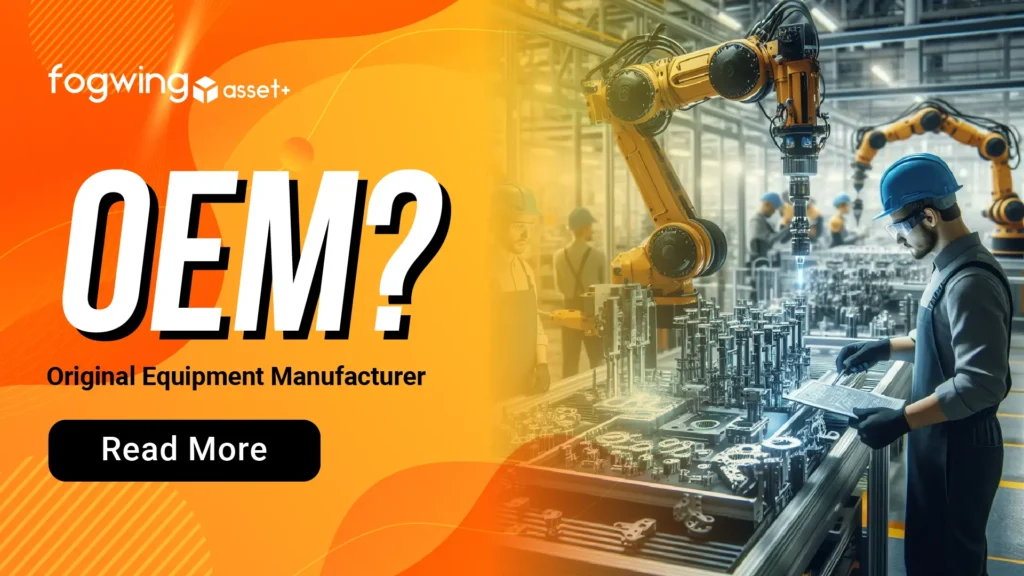In the dynamic landscape of manufacturing and Industry 4.0, understanding the essence of original equipment manufacturing (OEM) is essential. Understanding the Original Equipment Manufacturer is crucial for those involved in product creation, distribution, or consumption in the manufacturing world.
This blog aims to shed light on OEM’s significance, applications, and impact on industries worldwide. Join us as we delve into the realm of OEM, uncovering the underlying principles that drive innovation, collaboration, and product quality in today’s ever-evolving market.
What is Original Equipment Manufacturer?
An Original Equipment Manufacturer is a manufacturer who produces components or products that other companies eventually purchase and retain in their brand name. These manufacturers play a vital role in the supply chain, contributing essential parts or entire products integrated into the purchased companies’ final offerings.
Various industries, including automotive, electronics, and machinery, depend on an Original Equipment Manufacturer for their day-to-day operations. An OEM provides specialized expertise, cost-effective solutions, and manufacturing capabilities that enable companies to bring their products to market cost-effectively throughout production.
The collaboration of original equipment manufacturer solutions and the factories is one of the productive collaborations focusing on innovation, quality, and efficiency. The alliance enables the factory or the brand owners to focus on marketing, sales, and design rather than worrying about the parts or components to advance and create various products.
Original Equipment Manufacturer Example
Consider a well-known automotive manufacturer that produces and sells automobiles. However, they might only manufacture some components to build the vehicles.
And they collaborate with an original equipment manufacturer that makes the parts explicitly required by the automobile companies. Here are few original equipment manufacturer example in the automotive industry.
Engine Manufacturers:
Automotive manufacturers might work with original equipment manufacturer solutions specializing in engine production that manufactures engines according to the requirements of automakers. Later, the automotive manufacturer integrates these engines into the vehicles during assembly.
Brake System Manufacture:
OEM brake manufacturers play a vital role in the automotive industry. They design and produce brake systems that meet the requirements and standards of vehicle manufacturers.
These specialized equipment manufacturers also provide parts like rotors, brake pads, and master cylinders. The collaborations between an original equipment manufacturer and automakers contribute to the reliability and efficiency of vehicle braking systems, ensuring safety standards and performance expectations.
Electronics and Information System:
Electronic and information systems are integral to modern technology, shaping how we communicate, process information, and interact with the world.
Automotive industries might collaborate with an OEM that designs and produces advanced electronic devices and information systems that drive innovation, connectivity, and efficiency across various sectors, influencing digital transformation.
Original equipment manufacturer solutions in electronic and information systems also ensure that cutting-edge technological features are present in the vehicles.
Benefits of an Original Equipment Manufacturer

- Quality Assurance: An OEM embraces rigorous quality control measures throughout their production process, guaranteeing the production of parts or components of superior quality and exceeding industrial standards. The commitment to the quality of the product ensures reliability and longevity and builds trust among consumers and businesses.
- Customized Expertise: An original equipment manufacturer benefits businesses through customized expertise. Original equipment manufacturer solutions offer customized expertise by specializing in particular technologies or industries. It provides tailored solutions to meet the precise needs of its clients. Which eventually enables the client companies to access advanced, specialized knowledge and components without internally developing it. Henceforth, customized original equipment manufacturer solutions often empower businesses to enhance their products, streamline processes, and remain driven in rapidly evolving markets.
- Cost Efficiency: Cost-effectiveness is one of the critical factors that cause organizations to choose an original equipment manufacturer for manufacturing. These entities often have economics of sales and operational efficiencies due to their specifications in the production of specific components or parts. The large-scale production of components or parts leads to lower per-unit production costs and results in cost savings per unit, eventually making their products economically advantageous for businesses and end-users without compromising quality. The collaboration of the client companies with an OEM benefits the client organizations as they receive high-quality parts at a lower cost than if they were to produce the same intent in-house.
- Innovation and Expertise: An original equipment manufacturer often possesses specialized knowledge in particular industries or technologies, which enables them to stay at the forefront of innovation. The expertise offered by an OEM ensures the production of high-quality products. And their collaboration with brands fosters a dynamic exchange of ideas, pushing the boundaries of innovation and ultimately enhancing the capabilities of the supply chain in manufacturing sectors.
- Reliable Supply Chains: Original equipment manufacturer solutions, time and again, have well-established and efficient supply chain networks, ensuring a steady and timely flow of components or products to their client. With their expertise and industry connections, an original equipment manufacturer mitigates the risks of production delays, shortages, or disruptions, contributing to the timely production and delivery of materials and parts. Hence, a dependable supply chain enhances operational efficiency and strengthens the resilience of both parties in manufacturing processes.
OEM & Future of Maintenance in Manufacturing Sector
As the manufacturing sector embraces Industry 4.0, the role of an original equipment manufacturer is poised to be transformative within the manufacturing sector.
Original equipment manufacturer solutions integrate advanced technologies, like sensors, IoT devices, and AI, into their products. It enables the real-time monitoring of equipment and enables the predictive maintenance of assets.
Fogwing CMMS , a Smart CMMS platform, also allows intelligent asset maintenance and monitoring of factory or facility assets. It also enables the manufacturers to integrate with the OEM customers with its parts supplier features.
It effectively keeps track of the parts received, utilized, and in stock, making it easier and more accessible for the maintenance manager to keep track of the parts.
Fogwing CMMS enhances overall operational efficiency and helps the organization reduce downtime and repair costs. Additionally, it offers remote monitoring services and cloud-based platforms, enabling manufacturers to access maintenance information from anywhere and fostering a connected and agile manufacturing environment.
If you are a manufacturer looking for a maintenance platform, Fogwing CMMS is the one for you. It enables you to integrate with an original equipment manufacturer easily and keeps track of the parts effectively. The collaborative relationship between an OEM, manufacturers, and Fogwing CMMS will likely play a crucial role in shaping a future where data-driven and predictive maintenance becomes the norm in the manufacturing sectors.
Significance of OEM in Different Industries
Automotive Industry:
The original equipment manufacturer automotive companies OEMs hold significant importance. It enables the organization to enhance supply chain efficiency, guarantee quality control, and lead innovation. It also plays a critical role in integrating cutting-edge technologies and meeting regulatory standards.
These components are integrated into the final assembly process, contributing to the overall performance and functionality of the automobiles.
Electronic Industry:
The electronic industry is a dynamic sector encompassing the design, production, and distribution of electronic devices, components, and systems. Rapid technological advancements, innovation cycles, and global demand drive competition and evolution within the industry.
The electronics sector plays a critical role in modern society, shaping the development of smart devices, communication networks, automation, and emerging technologies like artificial intelligence and the Internet of Things (IoT). Collaborating with an original equipment manufacturer and brands ensures that electronic devices such as smartphones, laptops, and televisions meet the required specifications and standards.
Machinery and Equipment Manufacturing:
Machinery and equipment manufacturing is a vital sector that involves designing, producing, and distributing various machinery and equipment for diverse industries. An OEM enables the client companies to focus on their core production without manufacturing every part in-house. Critical aspects of machinery and equipment manufacturing include precision engineering, advanced manufacturing processes, and adherence to safety standards.
Technological advancements, automation, and innovation play crucial roles in shaping the competitiveness and efficiency of machinery and equipment manufacturing, with companies often specializing in specific niches to meet industry demands. An original equipment manufacturer in the machinery and equipment manufacturing sectors provides specialized parts and components essential to build industrial tools and equipment.
What are the Critical Factors to Consider While Partnering with OEMs?
Partnering with an original equipment manufacturer involves strategic considerations for successful collaboration. Some of the Critical factors to consider include:
Expertise and Reputation:
When partnering with an OEM, evaluating knowledge and reputation is critical. Expertise ensures compatibility, innovation, and quality in supplied components.
Assessing a reputation involves scrutinizing its track record for reliability, compliance, and adherence to industry standards. A reputable original equipment manufacturer contributes to product excellence and enhances the overall brand image, fostering trust and reliability in the partnership.
Customization Capabilities:
It is essential to assess the ability of an OEM to provide customizable solutions tailored to your requirements and ensure they meet unique product specifications.
The freedom to customize the parts or components enhances flexibility, enabling organizations to build personalized solutions that align with the current market demands and needs in the ever-evolving automotive industry landscape.
Innovation and Technology Adoption:
With the rapid growth of industry 4.0 technologies, it is essential to adopt advanced technologies to stay abreast of industrial advancements. In evaluating OEM partnerships, a key consideration is an original equipment manufacturer’s commitment to innovation and technology adoption.
The innovation and technology adoption ensure that the products supplied contribute to the final automotive product’s overall technological advancement and competitiveness. The ability to embrace innovation demonstrates adaptability and positions the partnership for long-term success in an industry characterized by rapid technological evolution.
Quality Standards and Certifications:
Before collaborating with any OEM manufacturing, it is essential to ensure that it meets the quality standards and the certifications required to maintain product quality and regulatory compliance.
Ensuring original equipment manufacturer solutions adhere to industry-specific quality standards, such as ISO certifications, is essential. Compliance with rigorous quality benchmarks guarantees the reliability and durability of supplied components.
It streamlines the integration process for an original equipment manufacturer. Prioritizing quality standards establishes a foundation for consistent and high-quality manufacturing processes, reinforcing the reliability and performance of the final automotive products.
Conclusion
In conclusion, Original Equipment Manufacturing is significant across various industries, including automotive, electronics, and machinery. An OEM contributes to supply chain efficiency, quality control, and innovation. They enable companies to focus on core competencies while benefiting from cost-effective, specialized components.
The collaboration between an original equipment manufacturer, manufacturers, and innovative technologies like Fogwing CMMS is poised to shape the future of data-driven and predictive maintenance in manufacturing. Recognizing the critical role of OEM manufacturing in sectors such as automotive, electronics, and machinery underscores their impact on product development, technological advancements, and overall industry competitiveness.
When partnering with an OEM, crucial factors like expertise, customization capabilities, innovation, technology adoption, and adherence to quality standards play pivotal roles in ensuring successful and enduring collaborations. As Industry 4.0 progresses, an original equipment manufacturer remains integral to the dynamic manufacturing landscape, driving progress and maintaining high product quality and efficiency standards.





